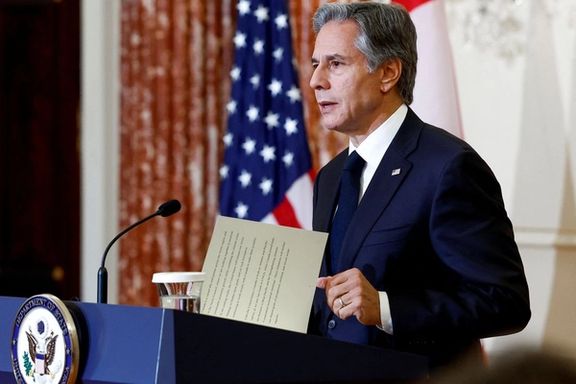Republican Senators Demand More Enforcement Of US Sanctions On Iran

After a flurry of Congressional initiatives and letters to the administration, eight Republican Senators have demanded more serious enforcement of US sanctions on Iran.
In a letter Friday addressed to Secretary of State Antony Blinken and the Secretary of the Treasury Janet Yellen, the senators raised the issue of China’s increasing oil imports from Iran, while US sanctions imposed in 2018 and expanded in 2019 prohibit third parties from buying Iranian oil and oil products.
“Despite sanctions, the People's Republic of China (PRC) has purchased roughly $47 billion in Iranian oil since President Biden took office. Iran's ghost armada, the regime's primary tool for illicit oil trade, has grown from 60 vessels to a staggering 338 vessels since 2021,” the letter says.

The letter was signed by Senators Marco Rubio, Lindsey Graham, James Lankford, Rick Scott, Bill Hagerty, James Risch, John Barrasso, and Jerry Moran.
Critics for a long time have been accusing the Biden administration of not seriously enforcing sanctions imposed by former President Donald Trump, while negotiating with Tehran to revive the 2015 JCPOA nuclear accord. They argue that a substantial increase in Iranian oil exports to China occurred when President Joe Biden assumed office. This in turn made Iran more intransigent in nuclear talks that began in April 2021 and reached an impasse last September.

While Iran was selling less than 250,000 barrels per day in 2019 and 2020, its daily shipments have now surpassed 1.5 barrels according to industry sources.
The Senators argued that lax sanctions enforcement enriches the Islamic Republic which in turn provides more support to its militant proxies across the region, enables the regime to suppress domestic dissent, attack US troops and assist Russia in its war on Ukraine.
“The administration's lack of sanctions and sanctions enforcement is directly undercutting American policy objectives in Europe, the Middle East, and beyond,” the Republican lawmakers underscored.
They asked the secretaries of state and treasury to devise a strategy to limit Iran’s petrochemical exports. “This strategy must include additional sanctions against PRC individuals and entities that continue to purchase, refine, or otherwise deal in sanctioned Iranian-origin oil.”
The senators urged the administration to “immediately enforce existing sanctions…and expand sanctions designations to include those who store Iranian oil, ship-to-ship oil transfer operators, individuals and entities, ports and port operators, and refineries and refinery operators - particularly in the PRC…Doing so will deprive the Iranian regime of critical revenues that they would use to harm U.S. interests and repress the Iranian people.”
There have also been bipartisan efforts in both the Senate and the House of Representatives in the past year to push the Biden administration to be more forceful against Iran.
The Solidifying Iran Sanction Act sponsored by Rep. Michael McCaul (R-Texas), the chairman of the House Foreign Affairs Committee, and co-sponsored by 24 lawmakers in the House and Senate including Democrats was introduced in May. The bill aimed to give permanent authorization to the president to implement sanctions on Iran by lifting a sunset clause on Iran Sanctions Act (ISA) of 1996.
On June 22, 33 US senators, or one-third of the Senate, joined to introduce the Iran Sanctions Relief Review Act (ISRRA – S.488) to “make it abundantly clear to the Biden Administration that any agreement made with Iran that involves sanctions relief must be submitted for Congressional review,” said Senator Bill Hagerty (R-Tenn) who led the effort.
Iran International reported June 29 that the administration’s Iran envoy Rob Malley was suspended due to a security investigation. This has further angered many lawmakers who say the State Department kept them in the dark.